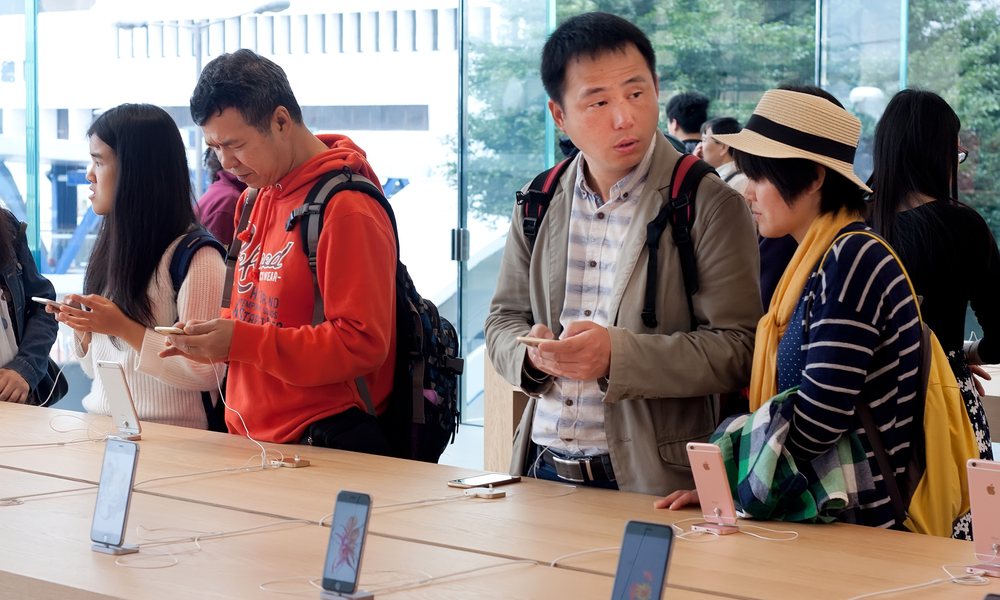Apple Partners With Alipay For Interest-Free Financing to Boost Chinese iPhone Sales
 Credit: Viktoria Roy / Shutterstock
Credit: Viktoria Roy / Shutterstock
Toggle Dark Mode
Ever since it was revealed earlier this year that Apple would miss its revenue guideline due largely to declining iPhone sales in China, Apple has been looking for ways to increase the demand for its newest iPhone models among Chinese consumers. Earlier this month, it was reported that Apple plans to release a “China Red” version of the iPhone XS and iPhone XS Max that will likely be exclusive for Chinese users, at least initially, and now it looks like the company is taking another step by offering attractive financing terms to as many Chinese consumers as possible to make its high-priced flagship iPhone XS models more affordable.
According The Wall Street Journal, Apple has partnered with Alipay, the popular Chinese mobile payment network, to offer no-interest financing for up to two years, allowing Chinese customers to purchase a new iPhone directly from Apple’s online store and pay for the device in monthly instalments over the course of 24 months, at zero percent interest.
The news went out jointly in announcements by Apple and Alipay this week. Customers have been told that they must make a minimum purchase of 4,000 yuan (~$595 USD) to qualify for the financing program, which places all of Apple’s current iPhone models within reach, including the iPhone XR, which currently sells for 6,499 yuan in China.
The financing offer is actually being extended to Alipay users through another subsidiary of Jack Ma’s Ant financial services empire, Huabei, which acts like a virtual credit card and already provides lines of credit to tens of millions of Alipay users for everything from daily shopping to online purchases. Huabei, which means “just spend” in Chinese, also told customers on Wednesday that it could temporarily increase their credit limits to allow them to purchase iPhones under the new financing arrangements.
Although Apple itself offered a similar financing program at its 42 physical Apple Stores in China last month, with Alipay boasting over 700 million users, the new partnership promises to help the company reach a much wider segment of the Chinese market. Further, according to a 2017 report from Ant Financial Services Group, one out of four Chinese citizens under age 30 are already users of Huabei, and actually prefer paying by instalment when purchasing mobile phones. It also stands to reason that these younger users also gravitate more toward online purchases, and the new partnership with Ant will allow Apple to more easily provide financing through its online store rather than requiring customers to visit one of its physical stores.
Apple is also providing 24-month interest-free financing for holders of credit cards issued by three Chinese state-owned banks, however China is a very different market when it comes to credit card use, with most Chinese consumers — especially younger ones — eschewing traditional credit cards in favour of mobile payment networks such as Alipay and WeChat Pay. This is also why Apple’s own Apple Pay service has failed to see the same kind of success in China that it has elsewhere.
Apple isn’t the only one struggling in China in recent months. Over the course of the past year, sales of higher-end smartphones have been softening considerably, resulting in Apple’s flagship iPhone XS series models being priced out of the market to the point where they’re basically unaffordable to the majority of the working class in China. However, other smartphone makers like Samsung have seen similar problems with higher-end models in various markets. Of all of the major smartphone makers, only Huawei significantly grew in sales and market share last quarter, likely as a result of its focus on producing medium-tier phones priced within the reach of the average Chinese consumer.
While it’s certainly important, however, price may not be the only factor creating resistance to the new iPhone models among Chinese consumers. Analysts and other industry experts in China have suggested that Apple’s iPhone may be too western-centric for the unique Far East market, and that Apple may in fact need to create a specific model just for Chinese users in order to regain any real traction in that country. This would represent a radical move for a company like Apple that has always preferred to take a “global” approach to its products, but with China accounting for a significant percentage of worldwide smartphone market, it may be impossible for Apple to ignore.






